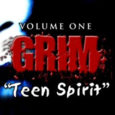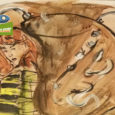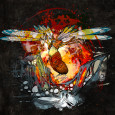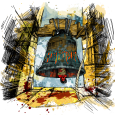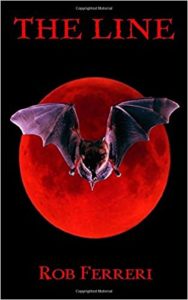 Vampires are a staple of Halloween and one of the most famous horror icons around. So I figured reading a vampire tale for Hallow-Reads was as good an idea as any. That’s when I was presented with The Line by Rob Ferreri, a self-published novel about a team of vampire hunters.
Vampires are a staple of Halloween and one of the most famous horror icons around. So I figured reading a vampire tale for Hallow-Reads was as good an idea as any. That’s when I was presented with The Line by Rob Ferreri, a self-published novel about a team of vampire hunters.
The Line tells the story of Alexander, an immortal ex-vampire and his mission to hide an ancient amulet from Dorian, his ex-master. When the amulet is discovered in present day New York, Alexander assembles a team to help him combat the vampire threat and protect the amulet. The team, which he dubs “the Line” are chosen ones, people who come from a long line of vampire slayers. The plot boils down to Buffy the Vampire Slayer meets The Avengers and works in many ways. However, there are quite a few ways that it just falls flat.
The book opens with a scene of our Alexander being healed of his vampirism and turning against his former brethren. It’s an interesting concept, one that doesn’t get explored often in pop culture, but it also doesn’t get explored much here, either. We know Alexander had a history as a vampire and worked with Dorian, but Ferreri never delves into that. There’s no back story showing us how Alexander became a vampire or what regrets he may have. We’re only told he was a vampire, isn’t any more, and now wants to rid the world of vampires.
The dialogue tags were the most tedious part of the book. Dialogue tags should be straightforward as the most effective ones are a simple “she said” or “he asked.” Sure, it’s great to mix them up a bit for some exclaiming, questioning, or accusing. But The Line makes them all as homogenous as possible. Every dialogue tag follows all of the dialogue. Every time. Now, this isn’t how most authors handle it; in scenes with two characters, for example, it’s generally easy to follow the flow of the dialogue, making the need for a tag each time unnecessary. But Ferreri uses them for every line and it gets very distracting.
From my understanding, The Line was originally written as a screenplay, and after reading it, that’s fairly obvious. The dialogue tags, for example, reminded me of slugs, the character name that precedes each line of dialogue, making it easy for the actor to know which lines are theirs and which belong to their costars. Sure, Ferreri punches up his dialogue with adverbs, but these are little more than parentheticals, the stage direction used to indicate how the actor should deliver the line.
This isn’t the only similarity The Line as a novel has to a screenplay. The book focuses a lot on the action; every few pages, a new action scene occurs. Whether it’s a showdown between the protagonists and the bad guys or some sort of training exercise, action scenes take precedence. Which makes sense considering The Line is a vampire based action adventure more than anything else. However, this focus detracts from any sort of character development, of which there is very little.
The Line is straight forward, to the point, and exactly what one could expect from a ninety minute action flick.
Does a novel need chapters of deep backstory to be enjoyable? No, not at all, but unlike movies, novels aren’t constrained by a certain length. There’s no hard and fast rule that a novel should be a set number of pages. In that sense, novels have an advantage over films when it comes to character development.
The Line implements a sort of ticking clock, yet another action movie trope. Alexander and Co must stop Dorian from getting the other half of the artifact before the next lunar eclipse or the world will suffer. Because of this, the plot moves at hyperspeed. Characters are introduced, destinies explained, trainings held, and lots of fight. There’s no time to get to know the cast. We see them put through the wringers of training a total of one time before they accept their fate. They trust each other implicitly after knowing each other for at most a couple of days. There’s very little internal conflict and it gets resolved in a page or two, which diminishes the stakes.
The parallel between The Line as a novel versus a screenplay makes sense when you look at author Rob Ferreri’s history. He’s worked on a few full-length feature films, most of which were made prior to the publication of The Line. He clearly has a strong grasp of writing, but it seems that scripting is a difficult habit to shake. Novels and screenplays are two different creatures and what works in one doesn’t necessarily work in the other. I don’t feel that his writing style is bad; just that it’s not the ideal approach for a novel.
Don’t get me wrong; there are quite a few good parts about The Line, most notably the character introductions. When we meet each of the characters, they get the spotlight in their own little vignette of a story. Detective Jay Hong is ambushed during one of the biggest cases of his career. The Blades brothers, Diego and Julian, are career criminals and we first see them during a high-octane car theft and eventual chase. Lena Somnianti is a sophisticated artist and fencer, a well-travelled and intelligent woman. They all make grand entrances, yet don’t really live up to their promise. Sure, they’re competent enough in their own right but none of them ever feel fleshed out besides what we learn at the outset.
This is really the fatal flaw of The Line. It never really lives up to its own story. It’s complete, has a plot and a diverse cast, but that’s the bare minimum when dealing with a novel. As a film, The Line would have been magnificent fun. More Underworld than Anne Rice, it didn’t quite fit into my idea of “horror” so it probably wasn’t the best entry for Hallow-Reads, but I still found myself engrossed in the tale as it unfolded.
The Line is available on Amazon. You can also see more of Ferreri’s work by visiting his comic publisher, Evil Kat Comix.
Grade: C
Don’t forget to try our Ten Family Friendly Halloween Movies to help lull the kiddos into a candy coma! Afterward, you can set the mood with Five Albums to Flesh Out Your Halloween Playlist and huddle under the covers with Netflix and Chilling – Halloween Movie Edition. Any other off-beat Halloween suggestions to throw our way? You can let us know on Twitter @SubCultured or come party like its 1599 in our Discord server!


